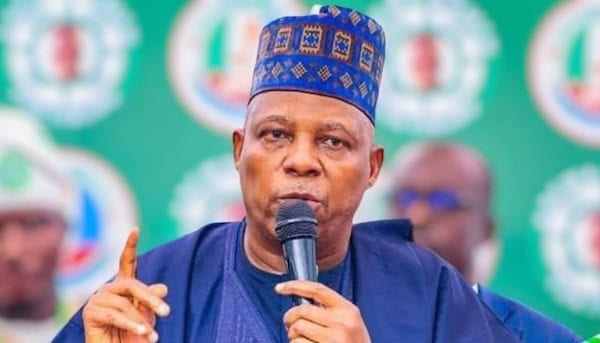Vice President Kashim Shettima has emphasized the need for Nigeria to persist with ongoing economic reforms despite the current hardship experienced by citizens. Speaking at the 30th Nigeria Economic Summit (NES) in Abuja, the Vice President acknowledged the difficulties faced by Nigerians but stressed that the reforms are essential to achieving sustainable economic growth.

“We Empathize, but Reforms Are Necessary”
“My heart and the heart of President Bola Tinubu go out to Nigerians for the hardship they are experiencing,” Shettima said. “But there is no alternative to these reforms if we want our economy to grow sustainably.”
The Vice President noted that Nigeria’s economy has long been dependent on oil revenues and unable to generate enough jobs to keep pace with its growing population. To reverse this trend, he emphasized the need for economic diversification into sectors such as agriculture, manufacturing, and the digital economy.
“The digital economy offers promising prospects. With the right investments, Nigeria can harness its demographic potential to become a global talent hub,” he added, highlighting that Nigeria has more English speakers than India and a young population with an average age of 16.9 years.
Unpopular Reforms Are Essential
Shettima admitted that many of the government’s policy decisions are difficult and unpopular, but stressed they are necessary to set the economy on the right path. “We need to transform our demographic bulge into demographic dividends rather than a disaster that could consume us,” he warned.
Empowering Small and Medium Enterprises (SMEs)
The Vice President also outlined the government’s plans to empower small and medium-sized enterprises (SMEs), reduce regulatory bottlenecks, and enhance the ease of doing business.
“We are prioritizing investment in critical infrastructure, promoting innovation, and providing single-digit loans for manufacturers,” Shettima said. “We have introduced a credit corporation to provide consumer loans to workers at single-digit interest rates, helping to stimulate economic activity.”
He highlighted efforts to expand social safety nets, such as the National Social Investment Program and the National Poverty Reduction Strategy, to protect vulnerable citizens during these challenging times.
Addressing Security and Macroeconomic Stability
Shettima acknowledged the security challenges facing Nigeria, including terrorism and banditry, which threaten both lives and livelihoods. He reiterated the government’s commitment to stabilizing the macroeconomic environment through fiscal reforms, such as subsidy removal, exchange rate unification, and debt management strategies.
“To achieve sustainable growth, we need an economy that can withstand shocks,” Shettima said. “We are not just managing crises but building a resilient economic framework that ensures long-term stability.”
Collaboration for Growth
The Vice President called for collaboration between the public and private sectors, civil society, and international partners to achieve shared prosperity. “The challenges before us are significant, but they are manageable. With the right partnerships and policies, Nigeria can emerge stronger and more competitive,” he stated.
Nigeria Economic Summit’s Role
Reflecting on the importance of the summit, Shettima praised the NES for fostering dialogue between the government and private sector stakeholders over the past three decades.
“The theme of this year’s summit, ‘Collaborative Action for Growth, Competitiveness, and Stability,’ is timely. It reflects the need for united efforts to address the multiple challenges facing the nation,” he said.
He also urged participants to generate actionable recommendations to enhance competitiveness and secure long-term stability for Nigeria.
Stay with VOP News for more updates from the 30th Nigeria Economic Summit.
SOURCE : VANGUARD

